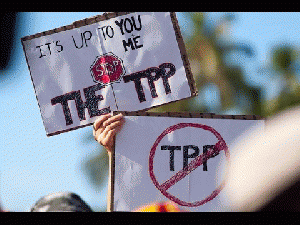Reprinted from Counterpunch
Last month the Peterson Institute for International Economics released a new study that projected the impact of the Trans-Pacific Partnership (TPP) on the U.S. economy. The study projected that when its effects are fully felt by 2030, the economy will be 0.5 percentage points larger than if we did not have the TPP. It also showed that annual exports would be $387 billion higher as a result of the deal.
These projections were widely reported in major media outlets and seen as evidence that the TPP would be a good deal for the United States and American workers. Unfortunately, a closer analysis of the Peterson Institute study indicates considerably less grounds for celebration.
First of all, some of the key questions that people have raised about the TPP are not answered by the Peterson Institute study because of the design of the model it used. First and foremost, people are worried that the TPP could open the door to another wave of imports, causing more workers to lose their jobs and putting downward pressure on the wages of the workers who keep their job.
The Peterson Institute study can give us no insight on this issue, since was not designed to address the question. The study tells readers:
"The model assumes that the TPP will affect neither total employment nor the national savings (or equivalently trade balances) of countries."
This means that the design of the model used in the study prevents it from saying anything at all about whether the TPP will lead to a larger trade deficit and a loss of jobs. The model explicitly assumes that the number of jobs is not affected by the TPP, so it provides us no information on the topic of the trade deficit and employment.
Furthermore, since it also assumes that the trade balance is not affected by the TPP the Peterson Institute was being a bit disingenuous in touting its projection that annual exports will increase by $387 billion. The assumption that the trade balance doesn't change means that its model also projected annual imports would increase by $387 billion due to the TPP.
The assumption that the TPP doesn't affect the trade balance is obviously unrealistic, but it can be useful in how we think about the TPP. One of the major aspects of the deal is requiring stronger and longer patent protections for pharmaceutical companies. President Obama and other politicians have touted this aspect of the deal, saying that we will make sure that other countries pay us for the research done by the pharmaceutical industry.
But it is important to understand who is getting paid in this story and who isn't. If we accept for the moment the assumption that the trade balance will not change as a result of the TPP, then if the pharmaceutical companies get more money for their drugs, then everyone else must get less. If the drug companies have a bigger surplus in their trade with other countries, everyone else must have a larger deficit.
As a practical matter, this means that we would have larger deficit in other categories in traded goods and services, with manufacturing quite likely being a big loser. In effect, the money that foreigners might have spent on our cars and other manufactured goods will instead be going to pay Pfizer higher prices for its drugs. More money for Pfizer means less money for GM.
The Peterson Institute model helps to make clear this tradeoff, the discussion of which has almost been completely missing from the public debate. President Obama and other proponents of the TPP speak of the stronger and longer patent and copyright rules in the deal as though these are provisions that offer benefits for the country as a whole.
The reality is 180 degrees in the opposite direction. These protections offer benefits to the executives of these companies and to their shareholders, but they are likely to mean fewer jobs and lower income for the rest of the country. There are undoubtedly positive aspects to the TPP that will make it attractive to substantial numbers of voters, but the stronger rules on patents and copyrights are not good news for most of the country.
This column originally appeared in the Los Angeles Times.






